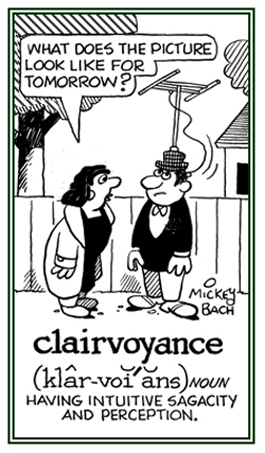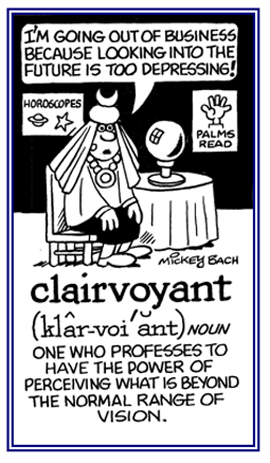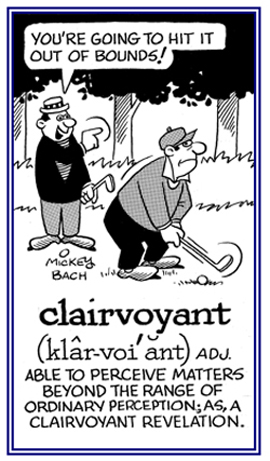vid-, video-, vis-, -vision, -visional, -visionally, visuo-, vu-
(Latin: videre, "to see"; plus words with other related meanings: to notice, noticing, noticed; observe, observing, observed; look, looking, looked; perceive, perceiving, perceived, perception; see, seeing, saw, seen, sight; view, viewing, viewed; manifest, manifesting, manifested; reveal, revealing, revealed, revelelation)
Although many of the words in this unit seem to be from other Latin origins, all of them are etymologically derived from the main Latin videre, "to see" element.
2. A roofed structure, especially a small pavilion or tower on top of a building, situated so as to view a wide area.
3. Etymology: "raised turret on top of a house", from Italian belvedere' literally, "a beautiful sight", from bel, bello, "beautiful" + vedere, "a view, a sight".
2. The physiological sense of sight by which the form, color, size, movements, and distances of objects are perceived: Central vision permits a person to read, to drive, or to perform other activities that require fine, sharp, straight-ahead viewing.
2. The perception and evaluation of the colors of the spectrum.
2. The ability to see or to perceive the color hues normally stimulated by the various parts fo the visible spectrum.
2. Etymology: from French clairvoyant, "clear-sighted"; from voyant, present participle of voir, "see".

Go to this Word A Day Revisited Index
so you can see more of Mickey Bach's cartoons.

Go to this Word A Day Revisited Index
so you can see more of Mickey Bach's cartoons.
2. Etymology: from Latin clarus, "clear" + voyant, videre, "to see".

Go to this Word A Day Revisited Index
so you can see more of Mickey Bach's cartoons.
2. CVS is caused by the decreased blinking reflex of the eyes while working long hours focusing on computer screens.
The normal blinking rate in human eyes is about 16–20 blinks per minute and recent studies have shown that the blinking rate decreases to as low as 6–8 blinks a minute for people who are working on computer screens for long periods and this can lead to an irritating condition called dry eyes.
3. A variety of problems related to prolonged viewing of a computer screen.
Short term effects include dry eyes, blurred vision, eye fatigue and excessive tearing.
Long term effects include migraines, cataracts, and visual epilepsy.
Some solutions include keeping reflections and glare to a minimum and to provide a non-fluorescent, uniform light source.
Special lamps are available that maintain the proper light around the monitor and generate light at much higher frequencies than regular light bulbs.
Glasses Can Correct Near and Far, but What About Those Screens in Between?
More people are showing up at eye appointments complaining of headaches, fatigue, blurred vision and neck pain—all symptoms of computer-vision syndrome (CVS), which affects about 90% of the people who have spent three hours or more a day at a computer, according to the National Institute for Occupational Safety and Health.
2. Boredom that results from something that has happened many times: There was a man who felt he had a permanent sense of déjà vu and he refused to watch TV or read a newspaper because he claimed to have seen everything before. When he went out walking he said the same birds sang in the same trees and the same cars drove past at the same time every day.
3. Etymology: from French déjà, "already" + vu, "seen"; from Latin videre, "to see".
Normally, the brain fuses slightly different images from each eye by matching corresponding points on each retina; however, when an eye muscle is paralyzed, the image falls at a different point and the images do not correspond which causes diplopia
Diplopia may be an early symptom of botulism (acute poisoning) or myasthenia gravis (disease characterized by progressive fatigue and generalized weakness of the skeletal muscles) and occurs in other infections, head injuries, and nerve or muscle disorders.


